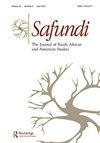论加冕的无政府状态:三个假设
IF 0.2
Q4 AREA STUDIES
Safundi-The Journal of South African and American Studies
Pub Date : 2020-10-01
DOI:10.1080/17533171.2020.1832800
引用次数: 0
摘要
本文探讨了以唐纳德·特朗普和雅各布·祖马等领导人为代表的新非自由主义批判的可能性条件。它提出了三个假设。首先,腐败不仅仅是法治的失败,也是法治最内在的可能性和最终结果。第二,新的非自由主义以扬弃某种批判传统(侧重于揭露和透明的实践)为前提。第三,今天的批评需要勇气去面对一个“令人眼花缭乱的世界”。本文章由计算机程序翻译,如有差异,请以英文原文为准。
On crowned anarchy: three hypotheses
ABSTRACT This essay explores the conditions of possibility for the critique of the new illiberalism exemplified by leaders such as Donald Trump and Jacob Zuma. It proposes three hypotheses. The first is that corruption is more than just a failure of the Rule of Law, but is also its innermost possibility and end result. The second is that the new illiberalism presupposes the sublation of a certain tradition of critique (focused on the practices of unmasking and transparency). The third is that critique today needs the courage to face a “giddy world.”
求助全文
通过发布文献求助,成功后即可免费获取论文全文。
去求助
来源期刊
CiteScore
1.00
自引率
0.00%
发文量
0

 求助内容:
求助内容: 应助结果提醒方式:
应助结果提醒方式:


